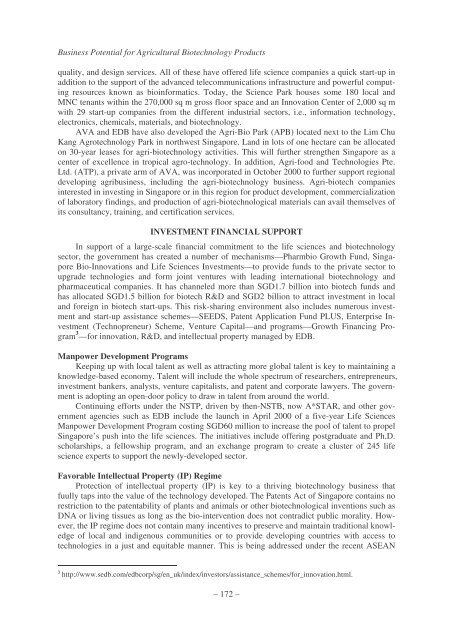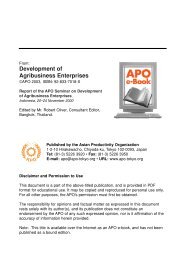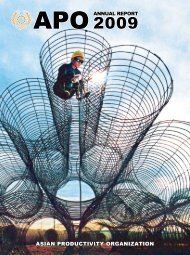Business Potential for Agricultural Biotechnology - Asian Productivity ...
Business Potential for Agricultural Biotechnology - Asian Productivity ...
Business Potential for Agricultural Biotechnology - Asian Productivity ...
Create successful ePaper yourself
Turn your PDF publications into a flip-book with our unique Google optimized e-Paper software.
<strong>Business</strong> <strong>Potential</strong> <strong>for</strong> <strong>Agricultural</strong> <strong>Biotechnology</strong> Products<br />
quality, and design services. All of these have offered life science companies a quick start-up in<br />
addition to the support of the advanced telecommunications infrastructure and powerful computing<br />
resources known as bioin<strong>for</strong>matics. Today, the Science Park houses some 180 local and<br />
MNC tenants within the 270,000 sq m gross floor space and an Innovation Center of 2,000 sq m<br />
with 29 start-up companies from the different industrial sectors, i.e., in<strong>for</strong>mation technology,<br />
electronics, chemicals, materials, and biotechnology.<br />
AVA and EDB have also developed the Agri-Bio Park (APB) located next to the Lim Chu<br />
Kang Agrotechnology Park in northwest Singapore. Land in lots of one hectare can be allocated<br />
on 30-year leases <strong>for</strong> agri-biotechnology activities. This will further strengthen Singapore as a<br />
center of excellence in tropical agro-technology. In addition, Agri-food and Technologies Pte.<br />
Ltd. (ATP), a private arm of AVA, was incorporated in October 2000 to further support regional<br />
developing agribusiness, including the agri-biotechnology business. Agri-biotech companies<br />
interested in investing in Singapore or in this region <strong>for</strong> product development, commercialization<br />
of laboratory findings, and production of agri-biotechnological materials can avail themselves of<br />
its consultancy, training, and certification services.<br />
INVESTMENT FINANCIAL SUPPORT<br />
In support of a large-scale financial commitment to the life sciences and biotechnology<br />
sector, the government has created a number of mechanisms—Pharmbio Growth Fund, Singapore<br />
Bio-Innovations and Life Sciences Investments—to provide funds to the private sector to<br />
upgrade technologies and <strong>for</strong>m joint ventures with leading international biotechnology and<br />
pharmaceutical companies. It has channeled more than SGD1.7 billion into biotech funds and<br />
has allocated SGD1.5 billion <strong>for</strong> biotech R&D and SGD2 billion to attract investment in local<br />
and <strong>for</strong>eign in biotech start-ups. This risk-sharing environment also includes numerous investment<br />
and start-up assistance schemes—SEEDS, Patent Application Fund PLUS, Enterprise Investment<br />
(Technopreneur) Scheme, Venture Capital—and programs—Growth Financing Program<br />
3 —<strong>for</strong> innovation, R&D, and intellectual property managed by EDB.<br />
Manpower Development Programs<br />
Keeping up with local talent as well as attracting more global talent is key to maintaining a<br />
knowledge-based economy. Talent will include the whole spectrum of researchers, entrepreneurs,<br />
investment bankers, analysts, venture capitalists, and patent and corporate lawyers. The government<br />
is adopting an open-door policy to draw in talent from around the world.<br />
Continuing ef<strong>for</strong>ts under the NSTP, driven by then-NSTB, now A*STAR, and other government<br />
agencies such as EDB include the launch in April 2000 of a five-year Life Sciences<br />
Manpower Development Program costing SGD60 million to increase the pool of talent to propel<br />
Singapore’s push into the life sciences. The initiatives include offering postgraduate and Ph.D.<br />
scholarships, a fellowship program, and an exchange program to create a cluster of 245 life<br />
science experts to support the newly-developed sector.<br />
Favorable Intellectual Property (IP) Regime<br />
Protection of intellectual property (IP) is key to a thriving biotechnology business that<br />
fuully taps into the value of the technology developed. The Patents Act of Singapore contains no<br />
restriction to the patentability of plants and animals or other biotechnological inventions such as<br />
DNA or living tissues as long as the bio-intervention does not contradict public morality. However,<br />
the IP regime does not contain many incentives to preserve and maintain traditional knowledge<br />
of local and indigenous communities or to provide developing countries with access to<br />
technologies in a just and equitable manner. This is being addressed under the recent ASEAN<br />
3 http://www.sedb.com/edbcorp/sg/en_uk/index/investors/assistance_schemes/<strong>for</strong>_innovation.html.<br />
– 172 –
















